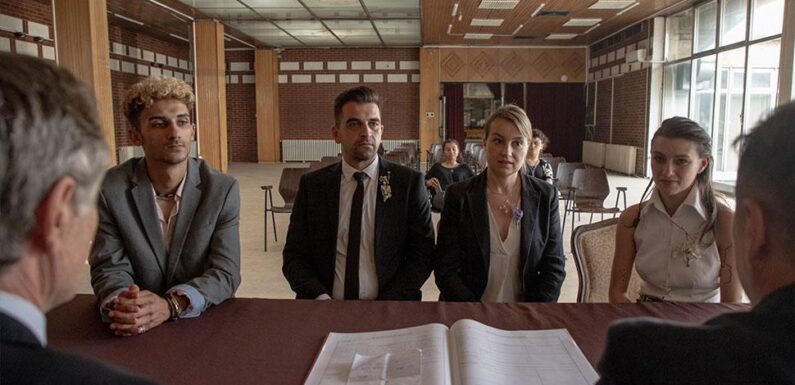
Not so much beginners as people who never get a fair go, the mixed bag of gay men and women in Australian-Macedonian filmmaker Goran Stolevski’s Housekeeping For Beginners, showing in Venice’s Horizons section, lives on a knife’s edge. Dita (Anamaria Marinca) owns the house where they jostle along together. Her Roma partner Suada (Alina Serban) has a teenage daughter Vanesa and another daughter, Mia, who is only five. Suada is volatile, belligerent and dying of cancer. Death is focusing her mind in alarming ways. Swear to look after the children, she shouts at Dita, holding a knife over her own arm.
Related Stories
Venice Film Festival 2023: All Of Deadline’s Movie Reviews
Venice Film Festival 2023 Photos: Richard Linklater, ‘Hit Man’ & ‘Day Of The Fight’ Premieres, Jack Huston
Dita swears, then looks for support from Toni (Vladimir Tintor), her old friend and longest-standing housemate, who has told his spanking new boyfriend, Ali, he can move in. Who is this kid?, Dita says one night, knowing that won’t happen. Everything around her is chaotic, including Suada’s barely existent medical care. An assortment of young lesbians lives there too, having somehow found Dita’s safehouse. Stolevski’s camera moves around with them, held by unsteady hands. There is an anxious stomach lurch when we realize we are about to watch that camera shake and rattle for two hours. Tough luck. We’re in this world now. Nobody gets a smooth ride.
Everything Stolevski does here, in fact, is aimed at conveying what daily life is like for people jammed with their conflicts into a space that always seems too small. He films in a ratio that squares off the image, squeezing the sides of every shot; it feels as if there is barely enough space in the frame for anyone to turn around. Those interior spaces are never defined — the camera is almost always juddering between people’s faces, catching their expressions as they speak over each other — but we see that this is a household of fold-down couches, kids in blankets, a crowded dining table and a pall of cigarette smoke, with a soundtrack of clattering, arguing and unwelcome noises from other people’s bedrooms. There isn’t much actual housekeeping, just Dita coming home from her office job to wash dishes and nobody helping.
But when Vanesa calls the police in a fit of teenage pique, telling them she has been captured by a gay cult, Dita goes into a whirl. Get rid of anything that looks gay, she shouts. Stuff goes into cupboards. The police duly arrive to find Dita in a frock, sitting on a couch with Toni, the two of them looking like models in a display home. Funny though it is, we see in this pause in domestic madness that, underneath the squabbling and endless smoking, these people are living in a state of constant fear, on the run from the law in their own home. When Dita questions Toni’s relationship with Ali – so much younger, so much rougher – he snaps back at her like an angry dog. How is he ever going to meet anyone of his own age? He doesn’t need to say it: he is lucky to have anybody.
In fact, they are all lucky to have Ali. He has the lightness of youth; every day is potentially a party for him. He joins Vanesa in raucous renditions of Macedonian rock songs and knows where she is when nobody else does; he becomes nanny to Mia. He is an opportunist; how could he not be?
Toni is difficult, suspicious and joyless, but at least he comes with a home and family attached. Good enough, then. Like Suada and Vanesa, Ali is Roma. The gulf between the races outside their walls becomes clear after Suada’s death, when Vanesa tells Dita she wants to live with her grandmother in Shutka, a ramshackle Roma town. They must all go with her to find her estranged grandmother; it is too dangerous for two women to drive there alone. Only Ali understands these mean streets and how to talk to the hustlers and traffickers who work them, which becomes vital when Vanesa, having decided Granny’s rubbish-strewn hovel isn’t going to be home, runs away.
But for all the crises they face – death, disappearance, rape – this is not a film driven by plot. It is all about the tangle of people portrayed by an ensemble so natural in its togetherness that they seem to be living the story for real. The company is led by Marinca, giving a forcefully present performance as the stalwart Dita, but everyone holds his or her own, even little Mia. Music fills any gaps. When the kids aren’t roaring along with some tinny hit, the score by Alen and Ninaud Sinkauz picks up on the racial conflict always seeping into the story’s edges: violins and accordions play the compelling rhythms, its mix of merriment and melancholy underscoring the household’s endless arguments.
It’s a tough ride, alright. It’s not going to set the box office alight, even in Macedonia – no, especially in Macedonia. But it confirms Stolevski’s standing, established with the witchy thriller You Won’t Be Alone, as a filmmaker of impressive originality, skill and style. Goran Stolevski. Remember that name.
Title: Housekeeping For Beginners
Festival: Venice (Horizons)
Director: Goran Stolevski
Screenwriter: Goran Stolevski
Cast: Anamaria Marinca, Alina Serban, Samson Selim, Vladimir Tintor, Dzada Selim, Mia Mustafa, Sara Klimoska, Rozafa Celaj, Ajshe Useini
Distributor: Focus Features
Running time: 1 hr 47 min
Sales agent: New Europe
Must Read Stories
Ava DuVernay Q&A, Neon Deal; Neeson Trailer; Linklater; Huston; Reviews
Hulu Stake Sale Timeline Moved Up; Valuation Likely To Far Exceed Initial $27.5B
CBS Will Have ‘NCIS’ Originals On Fall Sked With Paramount+’s ‘Sydney’ Spinoff
Japan’s Gaga Corp Talks ‘Monster’ Success, U.S. Strikes & Upscale Horror
Read More About:
Source: Read Full Article





